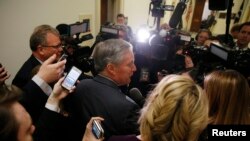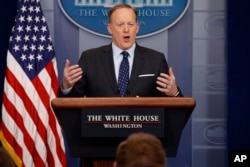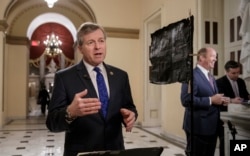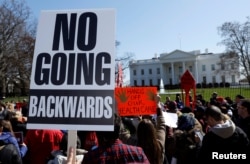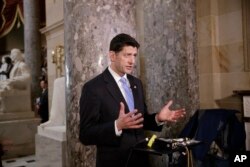Members of the U.S. House of Representatives conservative bloc known as the Freedom Caucus said after meeting with President Donald Trump they have reached no agreement on whether to repeal the Affordable Care Act, the law passed under former President Barack Obama seven years ago.
Congressman Mark Meadows, chair of the Freedom Caucus — conservatives who are sympathetic to the far-right Tea Party movement — confirmed Thursday that his group and the president had not reached an agreement on the issue.
The White House, however, had a different interpretation of Trump's talks with the congressional conservatives, releasing a statement saying the two sides had taken "a positive step" toward repealing the health care law in a vote that could take place as early as Thursday evening.
White House spokesman Sean Spicer told reporters Thursday that "many members," meaning House lawmakers, have indicated they will vote to repeal the health care bill. But, he added, "at the end of the day, we can't make people vote" to repeal the bill and replace it with an alternate version that Republican leaders have approved.
"It's a balancing act," Spircer said. He also told reporters Trump will be meeting with members of the Tuesday Group — moderate Republican House members — later in the day.
March 23 is the date when Obama signed the health care law, considered a signature achievement of his presidency.
Just hours before the impending vote on its repeal, Obama released a statement urging lawmakers not to make changes that would fail to improve health care for all Americans, as many opponents of the upcoming legislation contend.
However, Obama added, "If Republicans are serious about lowering costs while expanding coverage to those who need it and if they're prepared to work with Democrats and objective evaluators in finding solutions that accomplish those goals, that's something we should all welcome."
"But," he said, "we should start from the baseline that any changes will make our health care system better, not worse for hardworking Americans. That should always be our priority."
Although Republicans hold a majority in both houses of Congress, passing the bill is far from certain because of opposition from conservatives who say it does not go far enough and moderates who fear too many Americans would lose insurance coverage.
Trump has been meeting with Republican holdouts trying to sway them to vote for the repeal.
"Big day for healthcare. Working hard!" Trump said on his Twitter account Wednesday.
Earlier this week, Trump warned of political retribution against members of the House of Representatives who do not vote to overturn the health care law and send it on to the Senate where its fate is also uncertain. He said not following through on promises to overturn the Obama law could anger constituents and cost lawmakers their seats in the 2018 congressional elections.
"I'm gonna come after you, but I know I won't have to, because I know you'll vote yes," Trump told one House repeal opponent, Congressman Mark Meadows, leader of the Freedom Caucus. "Honestly, a loss is not acceptable, folks."
Trump and Republicans have long railed against the seven-year-old Affordable Care Act. The program added 20 million Americans to insurance rolls, but Republicans contend the cost of premiums and individual medical procedures not covered by the insurance has risen so much that many Americans can no longer afford to pay for the care they need.
The independent Congressional Budget Office last week concluded 24 million Americans would lose health care coverage over the next decade if the Republican plan is approved. Trump and Republican leaders contend their plan, unlike Obamacare, will give people access to buy the coverage that meets their needs and they can afford.
The Republican repeal plan would rescind the Obamacare requirement all Americans buy health insurance or pay a penalty if they do not, but keep two popular provisions. One would let young people remain on their parents' policies until they turn 26, while the other bars insurance companies from denying coverage to people with pre-existing medical conditions.
No House Democrats have said they will vote for the repeal, leaving Republicans alone to amass a majority of their lawmakers to approve it.
They cannot lose more than 21 of the 237 Republican votes for the repeal to pass before the measure is sent to the Senate.
Meadows said Wednesday he counts 27 Republicans who oppose the repeal or are leaning against it, but House Speaker Paul Ryan said he remains confident he will have enough votes to approve the repeal.
"This is the one chance we have to actually repeal Obamacare and replace it with the stuff we believe in," Ryan said. "The president is all in, we all made this promise, and that's why I'm confident.People will realize, I'm not going to go home and face voters reneging on my word."
Trump, staking the early months of his presidency on meeting his campaign vow to overturn Obamacare, told the lawmakers this was their best chance to repeal the measure.




